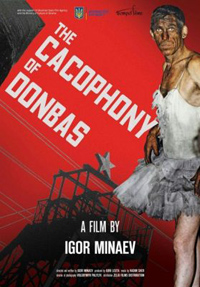Dissected Symphony: Minaev Deconstructs Soviet Propaganda with a dose of Humanism
 Finding the one and the only cause of a big historical event, especially when still ongoing, is an ambitious task. Igor Minaev, a French-Ukrainian film director, claims to have found the true core of the war in Ukrainian industrial region Donbas, started in 2014 and still continuing. Divided in two parts, and concluded with a humanistic pathos, The Cacophony of Donbas suggests its viewers to revise the Soviet propaganda starting with a classic avantgarde masterpiece Enthusiasm: The Symphony of Donbass (1930) by Dzyga Vertov.
Finding the one and the only cause of a big historical event, especially when still ongoing, is an ambitious task. Igor Minaev, a French-Ukrainian film director, claims to have found the true core of the war in Ukrainian industrial region Donbas, started in 2014 and still continuing. Divided in two parts, and concluded with a humanistic pathos, The Cacophony of Donbas suggests its viewers to revise the Soviet propaganda starting with a classic avantgarde masterpiece Enthusiasm: The Symphony of Donbass (1930) by Dzyga Vertov.
It all started (in Minaev’s version) when the Soviet Union created a myth about a mighty miner in Donbas, single-handedly lifting the nation over his shoulders. People who worked in the mines were convinced that nothing is more important than giving coal to the Motherland, just like Stakhanov – the Soviet hero whose labor feats were designed from the inside of propaganda buros. The story of how the Soviet government mastered the so-called triumph of a working class and how it all collapsed 60 years later is told by editing together pieces of films and chronicle videos about miners, and with the aid of voice-over. Minaev traces it back to the 1930s with the Dzyga Vertov film, and ends in 1990 with a huge miners’ strike shot by Anatoly Karas and Victor Shkurin who later created their own film The July Storms (1989-1991) which now is a document of great importance in terms of understanding the 1990s. Minaev’s story then jumps to 2014, when the region of the former miners’ glory is torn apart by war.
The part about war combines the footage of Russian soldiers in Donbas, taking photos that are circulated on social media, with Minaev’s own interviews. He speaks with Ukrainian civilians, with victims of the war and with Ukrainian artist Arsen Savadov, who tells the confusing story of how his famous and controversial photo-series Donbass Chocolate came to be. The director’s approach to the war in Donbas, it seems, is purely emotional. He obviously doesn’t want to create an aggressive propaganda film – that’s why the reference to Vertov’s The Symphony of Donbass amounts only to a quote and a reference in the title. He doesn’t use the war as pretext for a topical film, like Sergei Losnitza did in his award-winning Donbass. Minaev doesn’t even provide any reflection on the war itself, framing his film with vague shots of cloudy sky and messages about the hatred of the world.
His attempts at being more convincing show themselves in the choice of the narrator: Ukrainian actor Oleksandr Ignatusha is very well known to Ukrainian audiences as a popular voice in the dubbing of Hollywood films for Ukrainian TV. Meanwhile, foreign audiences have to rely on what the narrator says, without knowing how he says it. That’s when Minaev’s attempt at pathos starts to crumble, lacking any sort of rational background.
Some episodes in the film don’t add much to the narrative, and they definitely don’t elaborate on how the war started in the first place. A huge abyss in the story separates 1990 from 2014, and the gap isn’t justified. Moreover, some questions left unanswered tend to undermine the very idea of the film. Why did the active and pro-Ukrainian miners in the 1990 become the victims of a new pro-Russian propaganda and war? What became of Soviet myths after 23 years of Ukrainian independence? Are they still alive? Why? Answering these questions would likely require more than just one film. Still, minaev doesn’t even try, landing firmly on the side of emotions when it comes to this topic.
Minaev’s humanistic stance makes The Cacophony of Donbas work on an emotional level: the story flows smoothly and consequentially, supported by the voice-over and never neglecting to show evidence of people’s fate. The head-on stories about how Soviet propaganda shaped and changed the lives of a few generations in one region have tragic obertones. Seeing how the happy life and a promise of prosperity depicted in Vertov’s Enthusiasm turned out to be fake and led to war is truly heartbreaking. In the age of post-truth, a simple reminder of how quickly things can turn around is definitely worth heeding.
Reviewed on October 20th at the 2018 Warsaw International Film Festival – Documentary Competition. 62 Mins. Part of the The Fipresci Warsaw Critics Project.
★★★/☆☆☆☆☆


